
Malayalam cinema is the segment of Indian cinema dedicated to the production of motion pictures in the Malayalam language widely spoken in the state of Kerala, India. In 1982, Elippathayam won the Sutherland Trophy at the London Film Festival, and Most Original Imaginative Film of 1982 by the British Film Institute. The film Marana Simhasanam has won the prestigious Caméra d'Or at the 1999 Cannes Film Festival.
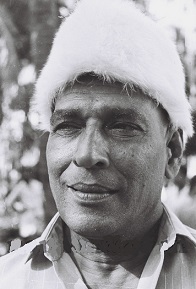
Balakrishnan Nair, more popularly known as Balan K. Nair was an Indian actor known for his roles in Malayalam cinema. Although he appeared as a villain in most films, he was also noted for his performances in strong character roles. He emerged as one of the top villain of Malayalam cinema in the second half of the 1970s and played some of the best villain characters in Malayalam films during that period. He won the National Film Award for Best Actor in 1981 for his performance as Govindan in the film Oppol.
Muthukulam Raghavan Pillai (1900–1979) was a Malayalam dramatist, poet, screen play writer and actor who was well known in the role of Ashaan in Kavyamela. He was born in 1900 in Muthukulam, a small village near Haripad in Alappuzha District, Kerala, India. Known as the Akshara Guru of Malayalam talkie films, he wrote the screenplay and dialogues of Balan, the first Malayalam talkie and Jeevithanauka, the first box office hit in the Malayalam film industry. He is also the author of about 55 dramas and dozens of film stories and screenplays. In 1968, he acted in Viruthan Shanku, the first full-length comedy in Malayalam cinema directed by P. Venu. He acted in around 150 Malayalam films and wrote Tataka Parinayam Kathakali. An award named Muthukulam Raghavan Pillai Puraskaram has been instituted by Muthukulam Raghavan Pillai Samraka Samithi in honour of him.

Marthanda Varma is a 1933 black and white Indian silent film directed by P. V. Rao, based on the 1891 Malayalam novel by C. V. Raman Pillai. This was the first film based on Malayalam literature and the next film of the Malayalam film industry after Vigathakumaran.

Kandam Becha Kottu is a 1961 Indian Malayalam-language drama film directed and produced by T. R. Sundaram under the banner of Modern Theatres. It stars Thikkurissy Sukumaran Nair and Prem Nawas in the lead roles, along with T. S. Muthaiah, Aranmula Ponnamma and Ambika Sukumaran in supporting roles. The film deals with the negative effects of the dowry system in India through customs of the Muslim community.

M. K. Kamalam was an Indian actress in Malayalam cinema. She was the heroine in the first Malayalam talkie film, Balan (1938).

Viruthan Shanku is a 1968 Indian Malayalam-language comedy film directed by P. Venu, starring Adoor Bhasi and Ambika. It revolves around Vikraman, and how he tricks people and steals their valuables in a comic way and also how he wins the heart of Kunjikkavu.
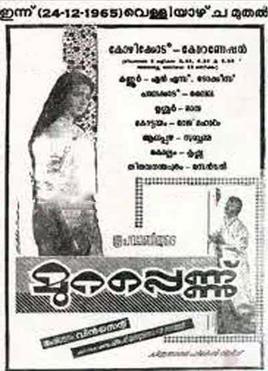
Murappennu is a 1965 Malayalam-language drama film directed by A. Vincent and written by M. T. Vasudevan Nair. The film stars Prem Nazir in the lead role with an ensemble supporting cast including Sharada, Madhu, Jyothilakshmi, K. P. Ummer, P. J. Antony, Jyothilakshmi and Adoor Bhasi playing the pivotal roles. The film revolves around a joint family and the romantic relationships between the cousins of the family. The film explores the Indian custom of marriage between cousins.
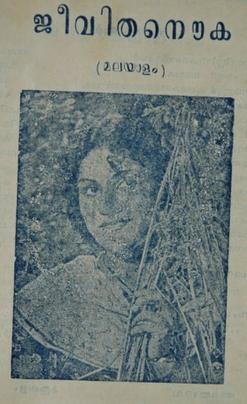
Jeevitha Nouka is a 1951 Malayalam-language film directed by K. Vembu and jointly produced by K. V. Koshi and Kunchako. It was the first "blockbuster cinema" in Malayalam cinema, with a theatrical run of 284 days. Made at a budget of ₹ 20000, this cinema did extremely well at the box office, such that very few cinemas could surpass it later. It was simultaneously shot in Tamil and Telugu, and was dubbed and released in Hindi. This cinema portrayed the life of simple folk in a small village in Kerala. It stars Thikkurissy Sukumaran Nair and B. S. Saroja, with the latter making her debut and the former in his first major role. Its music is composed by V. Dakshinamoorthy and popular playback singer Mehboob debuted through this cinema. It is a remake of the Hindi cinema Jeevan Naiya with revised screenplay.
Nagarame Nanni is a 1967 Malayalam language film, written by M. T. Vasudevan Nair and directed by A. Vincent. The film stars Prem Nazir, Usha Nandhini, Madhu and K. P. Ummer among others. The film tells the story of a family that migrates from a village to the city of Madras in search of a better life. The theme was about the lure of the city and how the dreams of villagers are shattered by its inexorable logic of greed. The plot is similar to the 1965 film The Conquerors of the Golden City, directed by Getin Gurtop and the 1964 film Birds of Exile by Halit Refig. K. Balachander's Tamil film Pattina Pravesham (1977) was based on all these three films.
Ollathumathi is a 1967 Indian Malayalam-language film directed by K. S. Sethumadhavan, produced by M. P. Chandrasekhara Pillai, starring Prem Nazir, Sathyan, Madhu and Sheela. The film has a musical score by L. P. R. Varma.
Ladies Hostel is a 1973 Indian Malayalam-language film directed by Hariharan and produced by Dr. Balakrishnan. The film stars Prem Nazir, Jayabharathi, Muthukulam Raghavan Pillai and Pattom Sadan in the lead roles. The film has musical score by M. S. Baburaj. The film was remade in Tamil as Then Sindhudhe Vaanam starring Sivakumar and Jayachithra.

Vazhve Mayam is a 1970 Malayalam-language film, directed by K. S. Sethumadhavan. Sathyan plays the lead role. The film also has Sheela, Sankaradi, K. P. Ummer, Bahadoor, Adoor Bhasi, K. P. A. C. Lalitha, Khadeeja, N. Govindan Kutty, Muthukulam Raghavan Pillai, C. A. Balan, Kuttan Pillai and Philomina. Sankarady won the Kerala State Film Award for Second Best Actor for his performance in the film. It has had a long lasting impact on Malayalam cinema, and was screened as part of the Sathyan retrospective at the 17th International Film Festival of Kerala held at Thiruvananthapuram. It was a Super Hit movie.
K. Kunju Nair was an Indian actor, singer and music composer in Malayalam cinema. He was the main character in Balan, the first sound film in Malayalam film in history.
Alleppey Vincent was an Indian actor in Malayalam cinema. He acted in Balan (1938), the first talkie made in Malayalam. He is the brother of Sebastian Kunjukunju Bhagavathar.
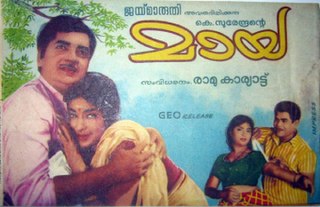
Maaya is a 1972 Indian Malayalam-language film, directed by Ramu Kariat for Jaya Maruthi, starring Thikkurissy Sukumaran Nair in the lead role. Prem Nazir and Sharada also play pivotal roles, supported by Vijayasree, Sujatha, Sankaradi and T. R. Omana playing other important roles. The film was based on an award-winning 1963 novel with the same name by popular novelist K. Surendran.
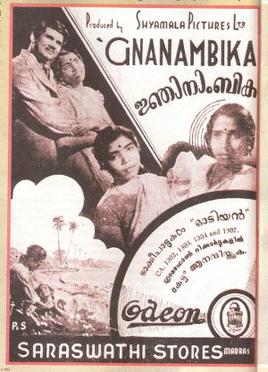
Gnanambika is a 1940 Indian Malayalam film, directed by S. Nottani and produced by Annamala Chettiyar. The film stars K. K. Aroor, Alleppey Vincent and Sebastian Kunjukunju Bhagavathar in lead roles. The film had musical score by T. K. Jayarama Iyer.
Ezhuthatha Kadha is a 1970 Indian Malayalam-language film, directed by A. B. Raj and produced by T. E. Vasudevan. The film stars Prem Nazir, Sheela, Adoor Bhasi and Muthukulam Raghavan Pillai. The film had musical score by V. Dakshinamoorthy.
Babumon is a 1975 Indian Malayalam-language film, directed by Hariharan and written by G. P. Balan. The film stars Prem Nazir, Jayabharathi, Srividya and Adoor Bhasi. It is a remake of the Hindi film Door Gagan Ki Chhaon Mein.

S. Nottani was an Indian filmmaker. He created the first Malayalam "talkie Balan (film) in 1938. He also directed a Malayalam movie, Gnanambika in (1940). His most contributions were mainly focused in the Tamil film industry. He directed Santhanadevan (1937), Satyavaani (1940), Bhaktha Gowri(1941), Sivalinga Satchi (1942) and Inbavalli(1949).












